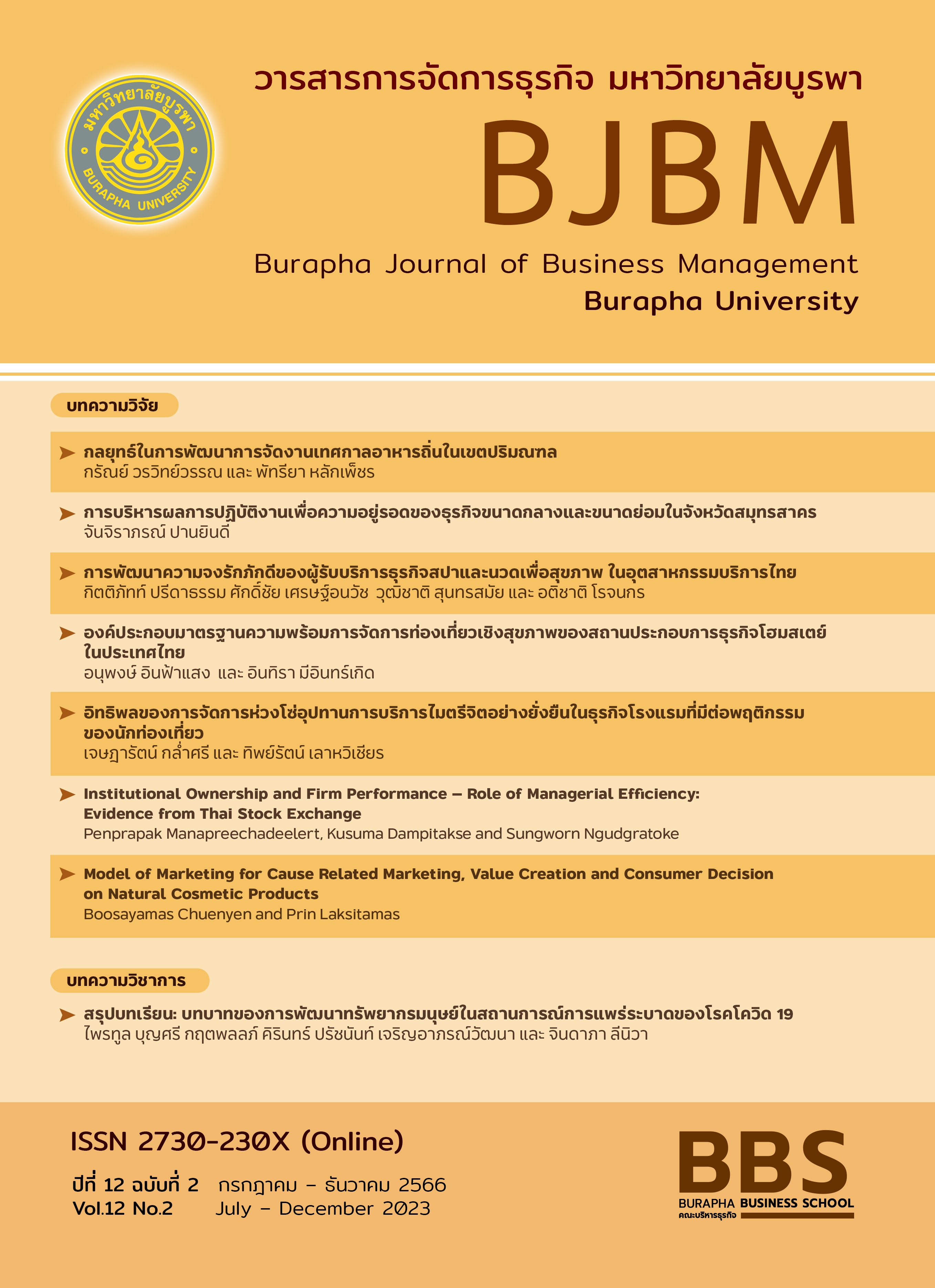องค์ประกอบมาตรฐานความพร้อมการจัดการท่องเที่ยวเชิงสุขภาพของสถานประกอบการธุรกิจโฮมสเตย์ในประเทศไทย
Main Article Content
บทคัดย่อ
การวิจัยครั้งนี้มีวัตถุประสงค์ 1) เพื่อศึกษาความพร้อมในการจัดบริการท่องเที่ยวเชิงสุขภาพตามมาตรฐานองค์ประกอบ 6 ด้านของสถานประกอบการธุรกิจโฮมสเตย์ในประเทศไทย 2) เพื่อศึกษาความพร้อมการให้บริการเชิงสุขภาพด้วย บริการหัตถการ สิ่งอำนวยความผาสุก และ นันทนาการเชิงสุขภาพ ของสถานประกอบการธุรกิจโฮมสเตย์ในประเทศไทย โดยมีกลุ่มตัวอย่างที่เป็นผู้บริหารสถานประกอบการธุรกิจโฮมสเตย์ที่ได้รับรองมาตรฐานการท่องเที่ยวไทย (Thailand Tourism Standard) จำนวน 355 แห่ง ใช้แบบสอบถามเป็นเครื่องมือในการวิจัย สถิติในการวิเคราะห์ข้อมูลได้แก่การใช้ค่าสถิติเชิงพรรณนา ค่าร้อยละ ค่าเฉลี่ย ค่าส่วนเบี่ยงเบนมาตรฐาน การวิเคราะห์ตัวบ่งชี้องค์ประกอบตัวแปรสังเกตุได้ในโมเดลการวัด (Measurement Model) ใช้การวิเคราะห์โมเดลสมการโครงสร้าง (Structural Equation Modeling : SEM)
ผลการศึกษาพบว่า 1) สถานประกอบการธุรกิจโฮมสเตย์ในประเทศไทย มีความพร้อมในการจัดบริการท่องเที่ยวเชิงสุขภาพตามองค์ประกอบมาตรฐาน 6 ตัวแปร ได้แก่ ด้านสถานที่ ด้านการบริการเชิงสุขภาพ ด้านการบริหารจัดการ ด้านบุคลากร ด้านสุขอนามัยความปลอดภัย และ ด้านความรับผิดชอบของผู้ประกอบการ 2) สถานประกอบการธุรกิจโฮมสเตย์ในประเทศ มีความพร้อมให้บริการเชิงสุขภาพทั้ง 3 ตัวแปร ได้แก่ บริการเชิงสุขภาพด้วยหัตถการ มีสิ่งอำนวยความผาสุก และ นันทนาการเชิงสุขภาพ
Article Details

อนุญาตภายใต้เงื่อนไข Creative Commons Attribution-NonCommercial-NoDerivatives 4.0 International License.
บทความที่จะตีพิมพ์เพื่อเผยแพร่ในวารสารการจัดการธุรกิจ มหาวิทยาลัยบูรพา จะต้องเป็นบทความที่ไม่เคยได้รับการตีพิมพ์เผยแพร่หรืออยู่ระหว่างการพิจารณาเพื่อตีพิมพ์เผยแพร่ในวารสารอื่น ๆ ทั้งนี้ หากพบว่ามีการละเมิดลิขสิทธิ์ ด้วยข้อคิดเห็นที่ปรากฏและแสดงในเนื้อหาบทความต่าง ๆ ให้ถือว่าเป็นความเห็นและความรับผิดชอบโดยตรงของผู้เขียนบทความนั้น ๆ มิใช่ความเห็นและความรับผิดชอบใด ๆ ของคณะบริหารธุรกิจ มหาวิทยาลัยบูรพา สำหรับในกรณีผู้ประสงค์จะนำข้อความในวารสารการจัดการธุรกิจ มหาวิทยาลัยบูรพา ไปเผยแพร่ต้องได้รับอนุญาตจากกองบรรณาธิการวารสารการจัดการธุรกิจ มหาวิทยาลัยบูรพา ตามกฎหมายว่าด้วยลิขสิทธิ์
เอกสารอ้างอิง
Atharn, D., Charoenwisarn, K. & Boonmeesrisanga, M. (2022). Elevating Safety Standards for Tourism and Sustainable Cultural Community Accommodation after the COVID-19 Outbreak in Thailand. Journal of Liberal Arts Thammasat Journal, 22(1), 186-204.
Boonmee, J., Sangkhouang, T. & Areekul, P. (2018). Strategies for homestay tourism in the South. Journal of Academic Resources Prince of Songkhla University Pattani Campus, 29(3), 74-89.
Boonsaeng, T. (2020). on Administrative Factors Affecting the Success of Homestay Business. Master of Business Administration Business Administration, Ramkhamhaeng University Chaloem Phrakiat Academic Resources Branch Nakhon Ratchasima.
Brand Buffet. (2022). Wellness Tourism Health Tourism New Unicorn, Thai Economy “covid-19”. Retrieved February 28, 2023, from https://www.brandbuffet.in.th/2022/06/ wellness-tourism-pr/.
Bureau of Recreation. (2017). Health Promotion Handbook, Department of Physical Education, Ministry of Tourism and Sports.
Chakbut, K. & Khamsing, N. (2018). Satisfaction of tourists toward the homestay service of Ban Kamphi Homestay Group, Kamphi Subdistrict, Mueang District, Maha Sarakham Province (Research report). Maha Sarakham Rajabhat University.
Chirakalwasan, N., Preutthipan, A., Maranetra, K. N., Yongchaiyudh, P., & Kotchabhakdi, N. (2020). Sleep medicine in Thailand, Journal of Clinical Sleep Medicine, 16(3), 451-453.
Chusri, W. & Lalitsasiwimol, V. (2020). on Health Tourism: Competitiveness of Thailand. Journal of Narathiwat Rajanagarindra University Humanities and Social Sciences, 7(2). 205-226.
Department of Health Service Support. (2016). Strategy to develop Thailand into an international health hub, Medical Hup (2017-2026). Retrieved February 28, 2023, from https:// www.thailandmedicalhub.net.
Department of Tourism, (2019) Wellness Services Standard for Tourism, Thailand Tourism Standard. Department of Tourism.
Duangpikul, K. & Methaphan, J. (2018). On Homestay and Sustainable Tourism Management in Nan Province. Journal of the Graduate School Chiang Mai Rajabhat University, 9(1), 217-234.
Hae Prakhon, T. (2012). Factors for success of local homestays in Thailand. Doctor of Philosophy Built Environment Interdisciplinary Program Faculty of Architecture and Planning Thammasat University.
Inthamon, C. & Lertputtharak. S. (2019). Business management model for homestay innovation in the community for tourists. Journal of Silpakorn University. 39(6), 85-103.
Kongphet, J. (2019). A Development of a Homestay Village for Environmental Conservation Tourism Services in Nong Bua Lamphu Province. Doctor of Philosophy (Environmental Education), Faculty of Environment and Resource Studies, Mahasarakham University.
Lertphaopanya, W. (2018). on the needs and operations of the homestay business. Independent.Master of Business Administration Program for CEOs & CMOs, Ramkhamhaeng University.
Niamchai, S., Panyam, K. & Watthanaphap, N. (2021). on Driving Efficiency of Health Service of Homestay Business in the Kingdom of Thailand. MFU Connexion: Journal of Humanities and Social Sciences, 10(2), 93-111.
Niu, Z. (2018). Factors Affecting Decision Making on Using Homestay in Amphawa, Samut Songkhram Province. Thesis of Hospitality and Tourism Industry Management, Graduate School, Bangkok University.
Sanaedee, P. (2018). Strategies for homestay accommodation development in the Eastern Lanna area to promote tourism in secondary cities. Journal of Administrative and Management innovation, 9(2), 14-27.
Siamrath. (2020). Department of Homestay Tourism for Healthy Homestay Health raises the tourism base to the community for sustainability. Retrieved February 28, 2023, from https://siamrath.co.th/n/171213.
Sokulrat, T., Nawatratee, T. & Chuapung, B. (2020). Risk Management of Homestay in Phra Nakhon Sri Ayutthaya Province. Journal of Social Science and Buddhistic Anthropology, 5(4), 305-320.
Sripratak, P. (2015). Legal Measures for Safety, Sanitation, and Environment in Carrying on Non-Hotel. Master of Laws, Department of Law Pridi Banomyong Faculty of Law, Dhurakij Pundit University.
Sukanthasirikul, K. (2015). Development of homestay service marketing potential. that has been certified in Nakhon Ratchasima (Research report). Sunari University of Technology.
Thai Industrial Standards Institute. (2022). health services for tourism, TIS. S 192-2565, Announcement of the Thai Industrial Standards Institute No. 3 (B.E. 2565), Ministry of Industry.
Tintabura, S. (2022). Sustainable homestay tourism management of family businesses in Koh Si Chang District. Chonburi Province. Master of Business Administration, Graduate School of Commerce, Burapha University.


